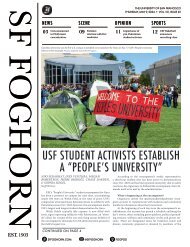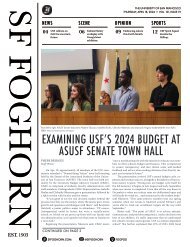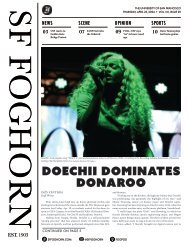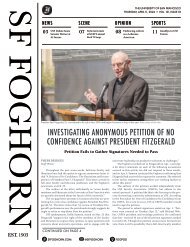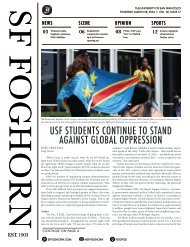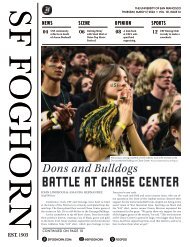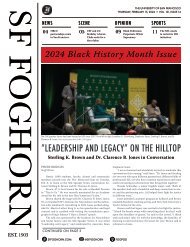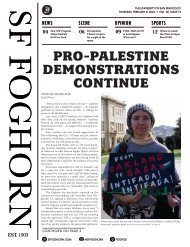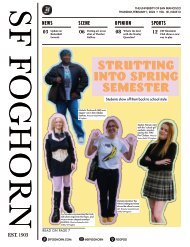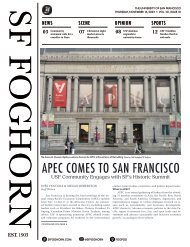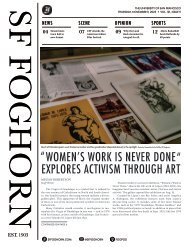VOL 120, ISSUE 16 - March 9th, 2023
Create successful ePaper yourself
Turn your PDF publications into a flip-book with our unique Google optimized e-Paper software.
08<br />
THURSDAY<br />
MAR 9,<br />
<strong>2023</strong><br />
DONAROO CONTINUED<br />
PERIOD PRODUCTS<br />
SHOULD NOT BE LUXURY GOODS<br />
09<br />
SCENE<br />
The Driver Era give their final bow on the Hilltop. PHOTO COURTESY OF DYLAN DIVINE-SICHERMAN/SLE MARKETING TEAM<br />
JORDAN PREMMER & TALEAH JOHNSON<br />
Staff writers<br />
Vocal chords were shot, bodies were left sore from dancing, and two bras<br />
were thrown at Donaroo on Saturday.<br />
This year the Campus Activity Board (CAB) invited alternative rock<br />
sibling duo, The Driver Era to headline the Hilltop’s annual concert. Compton-based<br />
rapper Buddy opened the show along with the two-time winner of<br />
CAB’s student DJ competition, DJ Muze.<br />
According to some Lone Mountain East residents, screaming could<br />
be heard all the way across campus when The Driver Era stepped on stage.<br />
Brothers Ross and Rocky Lynch emerged in red lighting along with their<br />
backing band toting electric guitars and broad smiles. With matching bejeweled<br />
cowboy hats — a hand crafted gift from CAB — they sailed through<br />
their newest album, “Summer Mixtape.” Cowboy hats are recurring features<br />
at Driver Era concerts — fans often bring them for the duo to wear on stage.<br />
The Hilltop practically melted as a collective as students screamed “I<br />
love you Ross,” and the room boomed with chants for Rocky, the more introverted<br />
of the duo. Several times throughout their set, The Driver Era used<br />
covers as bridges in their songs. High-energy “Heart of Mine” had a brief but<br />
groovy interlude with “Hold On, We’re Going Home,” originally performed<br />
by Drake, and “Malibu” was paired with Ginuwine’s sultry “Pony.” Every so<br />
often, Ross would dip into the pit and hug his mom, who watched proudly<br />
from the front row.<br />
Though doors opened at 6:30 p.m., students were camped outside of the<br />
entrance in their best outfits as early as 5:00 p.m. CAB sold over 1,000 tickets<br />
for the show, nearly twice the size of last year’s Donaroo.<br />
Wearing a cowboy hat, first-year computer science major Aria Srivasta<br />
was among the first to arrive at the War Memorial gym with her friends.<br />
Srivasta pointed to her friends as being the main reason for arriving so early.<br />
“They’re huge fans. Huge fans,” she said as her friends giggled in embarrassment.<br />
As soon as the doors opened, people ran with their friends to secure spots<br />
close to the stage.<br />
Fourth-year sociology major Destiny Camarillo was in the front row<br />
wearing a delicate, silver tiara for her birthday. The Driver Era was her second<br />
most listened to artist on her Apple Music Replay, and she was beaming. “The<br />
Driver Era is literally my favorite band. I’ve been a huge Ross fan since his<br />
Twitter brunette era in 2017.” When asked how she felt having The Driver Era<br />
at USF, she declared, “It feels like the best birthday gift ever.”<br />
The show’s openers heightened the already buoyant energy in the room.<br />
Students learned the electric slide with Buddy, who opened the event.<br />
Stumbling over each other, students slid from side to side, ad libbing “Go<br />
Buddy, go Buddy go!” in harmony. “Thank you for the love,” Buddy said to<br />
the crowd in between songs.<br />
DJ Muze, also known as second-year finance major Donny Musleh, was<br />
the winner of CAB’s student DJ competition and opened for the show for<br />
the second year in a row. Playing a mix of contemporary songs from genres<br />
ranging from hip hop to house, DJ Muze warmed the crowd up for a night<br />
of fun. The crowd broke into dance when they heard songs like Lil Uzi Vert’s<br />
“Just Wanna Rock” and Lil Jon’s “Snap Yo Fingers.”<br />
During a phone interview the next day, Musleh said that he loved being<br />
in a room where everybody “just wants to have a good time and share live<br />
music.”<br />
USF’s dance team,VarCity, gave an electric performance in between sets.<br />
“I am thankful to CAB for getting artists that I admire to be here,” said<br />
second-year media studies major Laura Stevenson after her first performance<br />
with VarCity. “When Buddy walked by and said, ‘Y'all ate’ I was like ‘OMG.’<br />
It’s really special to be recognized by a bigger talent.”<br />
In between spells of dancing and posting Instagram stories, students<br />
lined up to pose with friends in CAB’s sparkly photo booth.<br />
For some, this was their very last chance to experience Donaroo before<br />
they graduate. Emily Marcelino, a fourth-year nursing major, danced the<br />
night away with her friends for the last time at USF. “It’s really bittersweet,”<br />
she said. “I love just being together since we’re all seniors. It’s really sad leaving,<br />
but I’ve had the best time here.”<br />
After the show, fans waited outside of the gym in front of The Driver<br />
Era’s van, cheering for them as they walked out. Their screams echoed<br />
throughout campus, marking the end of a fun evening before the start of<br />
midterms.<br />
ANALICIA PARISH is a<br />
second-year advertising<br />
major.<br />
After a few years, most menstruators know<br />
the ins and outs of their flow all too well. However,<br />
many of us still face economic and social<br />
barriers when it comes to taking care of ourselves.<br />
Policies like the tampon tax present the<br />
larger issue of period poverty, and menstruators’<br />
healthcare continues to be inadequate because<br />
of the stigma around the topic.<br />
The American Medical Women's Association<br />
defines period poverty as “inadequate access<br />
to menstrual hygiene tools and education,<br />
including but not limited to sanitary products,<br />
washing facilities, and waste management.” Period<br />
poverty is partially caused by the shame<br />
around menstruation and a lack of accessible<br />
educational information. According to the<br />
2021 State of the Period report commissioned<br />
by Thinx and PERIOD, 84% of students in the<br />
U.S. have missed class or know someone who’s<br />
missed class because they couldn’t access menstrual<br />
products.<br />
In seventh grade, I got my period at my grandpa’s house where there<br />
weren’t any pads or tampons. After making due with toilet paper for three<br />
days, it was clear that I needed to tell my grandpa. Embarrassed, I called my<br />
mom, and she called my grandpa. Our trip to CVS was unpleasant, but he<br />
respected my privacy and had my back. When we got there he told me to grab<br />
anything I needed as he distracted my brothers. I must have been radiating<br />
discomfort, because a middle-aged woman asked if I needed help. Flustered,<br />
I muttered, “No thanks,” grabbed the first package my hand went to and sped<br />
toward the register.<br />
Despite how uncomfortable the<br />
situation was, I feel very privileged<br />
to have gone through it with the support<br />
of my mom, my grandpa, and<br />
even the random lady at the store. I<br />
didn’t want to admit it at the time,<br />
but I was relieved about the advice,<br />
kindness and privacy they provided.<br />
Many aren’t able to go on awkward<br />
CVS trips because of period<br />
poverty. Some countries, like the<br />
United States, tax sanitary products<br />
as luxury goods, according to the<br />
Alliance for Period Supplies. This is<br />
known as the “tampon tax.” In the<br />
United States the tax can go up to<br />
7%, and up to 20% in some countries<br />
in the European Union.<br />
But menstrual products are not<br />
a luxury — they are a necessity to<br />
maintain basic hygiene. The 2021<br />
State of the Period report found that<br />
“<strong>16</strong>% [of menstruators] have chosen<br />
to buy period products over food or<br />
clothes” and that low-income college<br />
students of color are “most impacted.”<br />
Menstruation is often an uncomfortable<br />
and painful time of<br />
the month. According to the Mayo<br />
Clinic, symptoms of premenstrual<br />
syndrome (PMS) include but are<br />
not limited to constipation, diarrhea,<br />
joint and muscle pains, uncontrollable<br />
mood swings, social withdrawal,<br />
and an increase in anxious or<br />
depressed moods. At the very least,<br />
menstruators should be able to easily<br />
acquire products that can make this difficult time easier to manage.<br />
Those who struggle with painful menstruation are still expected to accomplish<br />
their daily responsibilities, such as work and school. Period stigma<br />
prevents open discourse on the topic, and menstruators often receive undeserved<br />
criticism on their ability to concentrate or their quality of work. A<br />
study conducted in India by the National Library of Medicine found that<br />
45% of menstruators experienced concentration problems at school while on<br />
their period, but those who used disposable pads as opposed to cloth were<br />
39% less likely to report problems of concentration at school.<br />
Discrimination in academia and the workplace creates a cycle that prevents<br />
opportunities for menstruators, and globalized sexism places another<br />
barrier on top of the tampon tax. According to the Global Citizen, women<br />
are at a socioeconomic disadvantage due to the gender pay gap, and “earn less<br />
than men across all regions by an average of 23%,” making it harder still to<br />
afford period products. By eliminating the tax, we can work toward a more<br />
equitable future for menstruators.<br />
Advocates for menstrual equality such as Chris Bobel, a professor of<br />
gender and sexuality at the University of Massachusetts Boston, note that<br />
the first step to ending period poverty is for the government to recognize<br />
period products as a basic need that everyone, regardless of socioeconomic<br />
status, should be provided with. Normalizing conversations about menstruation<br />
will help change cultural attitudes, debunk menstruation myths, and<br />
encourage empathy towards menstruators’ experiences. NPR reported that<br />
after UNICEF distributed an educational comic about periods in Indonesia,<br />
“Knowledge that menstruation is a normal process jumped from 81% to 97%<br />
in girls and from 61% to 89% in boys.”<br />
When cultural attitudes start to change, systemic policies like the tampon<br />
tax have a better chance of changing. Too often, we are made to feel like<br />
a burden while menstruating, but our bodies are not the issue — people’s<br />
ability to talk about periods is.<br />
GRAPHIC BY MILLY TEJEDA/GRAPHICS CENTER<br />
OPINION




